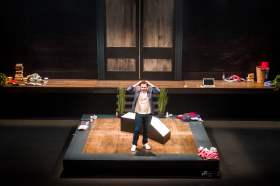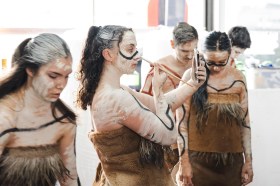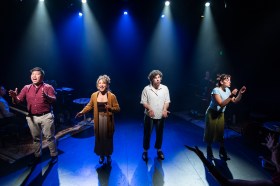A ‘McGuffin’, as enthusiasts of Alfred Hitchcock can tell you, is a plot device that relies on the motivation of a character to propel the story. Typically, the McGuffin the characters are pursuing is something without intrinsic value, but which is extremely important to them. In Sam O’Sullivan’s new play, McGuffin is also the name of a small Australian town, where a new mayor is about to be elected by the council’s eight members.
The mayoralty of McGuffin is a true McGuffin in the sense that it does not appear to be a role with any particular power or evident appeal, but its attainment is very important to Jack and Fiona, childhood friends who become bitter rivals for the position.
If using the name McGuffin in this way seems a little too knowing, the play may not be for you. O’Sullivan’s script is clever, but it wears its cleverness on its sleeve. It is not so much that it breaks the fourth wall, but that it has been built without one. Brecht’s Verfremdungseffekt (or alienation effect) is not only explicitly name checked – Brecht himself shows up for a cameo. This reviewer was willing to go along with this, because the play is very funny and the alienation effect is an important source of its humour.
Another reason why the play succeeds is the excellent work of the cast – a troupe of five (Thomas Campbell, Jamie Oxenbould, Lizzie Schebesta, Eloise Snape and Shan-Ree Tan) who ably split between them the eight councillors and a few other parts besides.
Again, this doubling up of roles will either amuse or frustrate – one person overheard while leaving the theatre suggested “it would have been easier with more actors”, but this writer agrees with her interlocutor who suggested in response that “it’s all part of the fun”.
McGuffin Park has also set itself the challenging task of saying something about the nature of democracy itself. As O’Sullivan says in his playwright’s note, right now democracy is “under attack all over the world as it attempts to adapt to the 21st century”. Can a play about a council election in small town Australia add anything meaningful to that conversation?
Read: Exhibition review: Magritte, Art Gallery of NSW
In some ways, the objective stakes being so low makes the mayoralty of McGuffin the ideal setting to explore some of the trappings inherent to democracy, whatever its stage. The ultimate message is that democracy is as good a system as the people who comprise it. That may not be particularly original, but the play’s true insights as well as its humour come from its exploration of whether we should find that message a cause for comfort or alarm.
McGuffin Park
Playwright: Sam O’Sullivan
Director: Mark Kilmurry
Dramaturg: Sarah Odillo Maher
Set and Costume Design: Simon Greer
Lighting Design: Trudy Dalgleish
Composer and Sound Design: Jessica Dunn
Stage Manager: Lauren Tulloh
Assistant Stage Manager: Lara Kyriazis
Costume Supervisor: Evelyn Everaerts-Donaldson
Cast: Thomas Campbell, Jamie Oxenbould, Lizzie Schebesta, Eloise Snape, Shan-Ree Tan
McGuffin Park will be performed until 23 November 2024.





